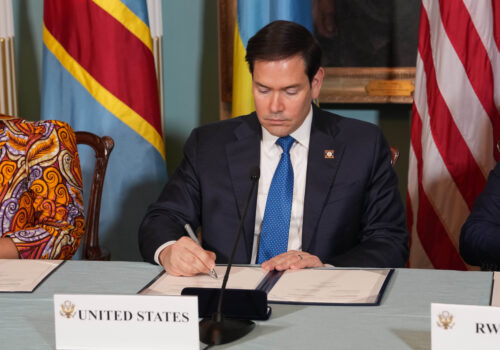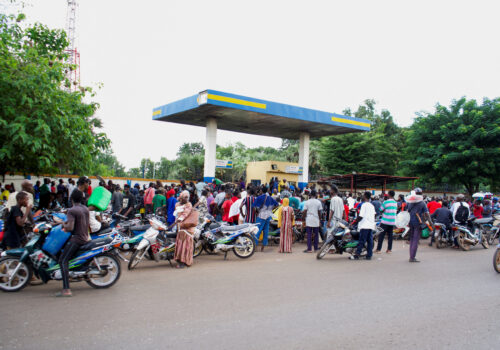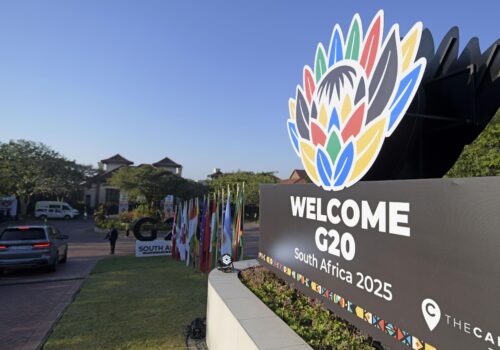This article is the first in a series published by the Atlantic Council’s Africa Center and the GeoStrategy Initiative of the Scowcroft Center for Strategy and Security exploring the nexus between US security and economic interests across Africa.
On Africa’s southeastern coast along the Indian Ocean, Mozambique sits atop vast reserves of hydrocarbons and critical minerals. The country also controls a vital shipping corridor: the Mozambique Channel. Stretching between the mainland and Madagascar, this passage has become a critical chokepoint for commercial vessels seeking to bypass the pirate-ridden Red Sea.
Long overlooked by US policymakers, Mozambique’s resource wealth and strategic location have now brought it into the spotlight for foreign investment. Yet economic engagement in the country is anything but straightforward, as most of its assets are concentrated in the north—the same region where the Islamic State affiliate ISIS-Mozambique (ISIS-M) remains active.
For the United States, which increasingly seeks access to critical minerals and strategic resources—and remains committed to counterterrorism—this necessitates a twofold strategy: it must not only build commercial ties with Mozambique, but also strengthen security-sector cooperation to safeguard the country’s stability and economic potential.
From terrorism to trade?
Gas discoveries in the north during the 2010s catapulted Mozambique into the top ranks of global gas producers. Since then, the US Export-Import Bank (EXIM) and the US International Development Finance Corporation (DFC) have invested heavily in the country’s energy sector—and particularly in developing its liquefied natural gas (LNG) reserves—and more modestly in projects that support economic stability in northern communities. Today, the combined commitments of ExxonMobil’s Rovuma Basin LNG project and TotalEnergies’ investments in Mozambique exceed the country’s gross domestic product.
In March 2025, EXIM approved a $4.7 billion loan for LNG equipment and services. Similarly, DFC launched several projects, ranging from less than $175,000 to $1.5 billion, aiming to bolster energy security for large LNG ventures and the surrounding communities. Besides forming the basis for mutually beneficial economic engagement, the United States hopes that these investments help build resilience in areas that might otherwise tolerate or even support ISIS-M. Exxon’s and Total’s investments in Mozambique also represent key down payments to ensure a stable supply of non-Russian LNG for the United States and its allies. At the same time, they have already led to increased security coordination between Mozambique and the United States, proving that investment can drive engagement.
Violence in the north puts economic development at risk
Beyond its gas reserves, Mozambique hosts the Balama mine—one of the world’s largest graphite mines—along with several other emerging critical minerals sites. Mozambican graphite is used in steelmaking, nuclear reactors, lithium-ion batteries, and as a lubricant for heavy machinery—all essential to the US industrial base. In addition, new mining concessions continue to be announced across the country.
Yet progress toward exporting Mozambique’s LNG and critical minerals has been severely hampered by insecurity. ISIS-M’s terrorist attacks in the north, which began in 2017, pose a direct threat to major US energy and critical minerals investments in the province of Cabo Delgado. They not only disrupt local governance but also cause mass displacement and casualties. According to the Armed Conflict Location & Event Data Project (ACLED), Mozambique has witnessed 2,162 political-violence events and 6,165 total fatalities since 2017—2,554 of them civilian.
Mozambique was identified as a priority country under the Global Fragility Act (GFA), passed into law during the first Donald Trump administration. Despite that designation, meaningful policy attention and funding have not materialized. Instead, the current administration rescinded $200 million in GFA funds that would have been shared among Mozambique and eight other countries to promote stability near LNG and mining projects. This stands in stark contrast to the nearly $820 million in development assistance that Mozambique received in FY 2024, mostly for health programming.
Building stability through partnership and purpose
The Rwandan Defense Forces (RDF) first deployed to Mozambique in 2021 as part of the Southern African Development Community (SADC) mission in Mozambique and have since maintained a presence in the north. While imperfect, the RDF presence has helped reduce violence to the point that the TotalEnergies–ExxonMobil consortium recently lifted its force majeure declaration that froze its Cabo Delgado LNG project mid-construction in 2021. The mission—coordinated by Rwanda and SADC—reflects the oft-promoted principle of “African solutions to African problems.” Still, Rwanda’s efforts alone will not stabilize the area.
Given that Mozambique possesses strategic resources highly sought after in the United States and that its terrorist threat is manageable, the US administration—working with Rwanda and in partnership with France, Portugal, and other allies and partners with investments in Mozambique—should pool resources to stabilize the country. Such a diverse group working to promote Mozambique’s security and prosperity—while respecting the country’s sovereignty—would also align with the burden-sharing model the Trump administration aims to advance in its foreign engagements.
To reinforce regionally-led counterterrorism efforts that both preserve Mozambican lives and promote stability around key US investments, the Department of Defense and the State Department should expand security cooperation and security assistance in northern Mozambique—especially because failure to engage risks leaving US firms dependent on insufficient Rwandan support or Chinese security guarantees. US Special Operations Forces, with their unique capabilities in counterterrorism training and civil-military operations, could strengthen Mozambican and regional forces through joint combined exchange training, civil affairs projects, and military information support operations.
Mozambique could point the way for US engagement in Africa
Combined with the local economic growth that energy and minerals projects bring, such efforts can pave the way for northern communities to no longer view ISIS-M as their only opportunity. Instead, US security investments should help rebuild trust in the state by delivering security, essential services, and livelihoods that reduce the appeal of extremism. Maritime forces from the United States and partners such as India should also conduct freedom of navigation operations in the Mozambique Channel to preserve open access to this vital trade artery. Finally, the State Department’s counterterrorism programs should strengthen community-security force cooperation to protect strategic investments and prevent further terrorist attacks. Security for communities will translate into security for assets. If Washington wants sustainable influence in Africa, it must align stability with shared prosperity.
As global competition for critical resources intensifies, Africa will serve as a testing ground for the fusion of finance and security. Modest, targeted investments in Mozambique’s stability—building on those already made by regional partners—and a focus on value creation represent the clearest example for how US capital can shape a security posture in Africa. Mozambican President Daniel Chapo’s visit to Washington in late October, where he met with US Vice President JD Vance and the chief executive officer of the DFC, underscores this growing convergence of economic and security priorities. As Chapo announced on the sidelines of this year’s United Nations General Assembly, “Mozambique is open for business.”
Indeed, integrated regional solutions supported by measured US engagement can help ensure Mozambique remains a stable and secure partner contributing to the US industrial base. Such a strategy could make the country a model of “security through investment”—a blueprint the United States could apply elsewhere in Africa.
Rose Lopez Keravuori is a nonresident senior fellow at the Atlantic Council’s Africa Center, an associate director at Strategia Worldwide, and chair of the board of advisors of GCR Group. She previously served as the director of intelligence at the US Africa Command.
Maureen Farrell is a nonresident senior fellow at the Atlantic Council’s Scowcroft Center for Strategy and Security and vice president for global partnerships at Valar, a Nairobi-based strategic advisory and risk firm. She previously served as the deputy assistant secretary of defense for African affairs and director for African affairs at the US National Security Council.

The Africa Center works to promote dynamic geopolitical partnerships with African states and to redirect US and European policy priorities toward strengthening security and bolstering economic growth and prosperity on the continent.

The GeoStrategy Initiative, housed within the Scowcroft Center for Strategy and Security, leverages strategy development and long-range foresight to serve as the preeminent thought-leader and convener for policy-relevant analysis and solutions to understand a complex and unpredictable world. Through its work, the initiative strives to revitalize, adapt, and defend a rules-based international system in order to foster peace, prosperity, and freedom for decades to come.
Further reading
Tue, Nov 4, 2025
The Millennium Challenge Corporation is needed for peace in the Great Lakes Region—and US mineral security
AfricaSource By Aubrey Hruby
The Trump administration must back its diplomacy by demonstrating the United States' willingness to turn fragile deals into local development.
Fri, Oct 31, 2025
Mali has not just plunged into crisis. It has been unraveling for years.
AfricaSource By
Mali’s crisis runs deeper than recent coups. Military fragmentation, jihadist expansion, and severed international ties have left the landlocked nation isolated, economically strained, and socially fractured.
Thu, Oct 16, 2025
African voices are shaping G20 discussions around international financial architecture reform
AfricaSource By
Africa is not merely affected by these reforms. It is actively shaping them.
Image: Traditional fishing boats sail as Mozambique's tuna fleet sits in dock beneath Maputo's skyline, in this picture taken August 15, 2015. Mozambique, one of the world's poorest countries, discovered the reserves off its coast between 2010-2013, offering an opportunity to transform the former Portuguese colony which was ravaged by a 16-year civil war that ended in 1992. Recent signs of reckless government spending and an uptick in political violence have raised concerns that Mozambique could be the latest African country to suffer the resource "curse," in which an influx of petro-dollars suffocates the rest of the economy, encourages corruption and stirs unrest. Picture taken August 15, 2015. REUTERS/Grant Lee Neuenburg




